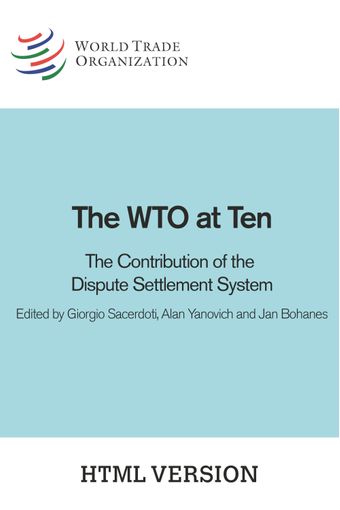- Home
- Books
- The WTO at Ten
- Chapter
From afterthought to centrepiece: The WTO Appellate Body and its rise to prominence in the world trading system

- By: Peter Van Den Bossche
- Source: The WTO at Ten , pp 21-21
- Publication Date: January 2006
- DOI: https://doi.org/10.30875/cfe2f992-en
- Language: English
Since February 1996, when the first appeal was filed, the Appellate Body of the World Trade Organization (WTO) has heard and decided 65 appeals from panel cases. The body of case-law generated by the Appellate Body over the past nine years is, both in quantitative and qualitative terms, impressive. From 1996 to 2004, the Appellate Body has issued twice as many decisions as the International Court of Justice (ICJ) did during the same period. The Appellate Body’s case-law is highly authoritative and has made a significant contribution to the development of international trade law. The decisions of the Appellate Body in, for example, EC – Bananas III and US – Shrimp, have effectively put an end to politically as well as economically complex and sensitive disputes between WTO Members. Both panels and parties in WTO disputes have shown, and continue to show, much deference to the case-law of the Appellate Body. The Appellate Body is undoubtedly the most important organ of WTO dispute settlement. The Appellate Body is, all but in name, the World Trade Court. In recent years a few authors have accused it of exceeding the authority conferred on it and of engaging in judicial legislation, especially in cases on anti-dumping and safeguard measures. More generally, WTO Members, after losing a case, allege not infrequently that the Appellate Body has added to or diminished the rights and obligations of Members. This paper does not seek to verify whether this is indeed the case. These accusations, and the ‘emotional’ terms in which they are often expressed, are, however, clear evidence of the importance that the Appellate Body and its case-law now have in the WTO system. The key question addressed in this paper is what explains the prominent status which the Appellate Body and its case-law have achieved since 1996. Was the ‘success’ of the Appellate Body ‘predetermined’ by its constituent instruments, or is it primarily the result of other factors that have affected the Appellate Body and its case-law in the past nine years?
-
From This Site
/content/books/9789287046734s013-c003dcterms_subject,pub_countryId-contentType:WorkingPaperSeries -contentType:Periodical -contentType:BookSeries -contentType:ReportSeries105


